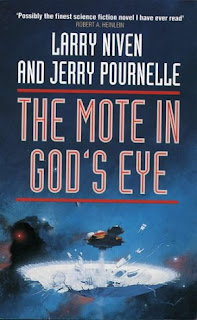After he corrected the errors in his reference materials, he achieved the impossible designing the Misubishi A6M Zero, the most capable fighter airplane at the beginning of World War II.
 During the height of the Cold War, Jerry Pournelle and Larry Niven wrote several stories about the Co-Dominium wherein the USA and USSR decide to get together quit competing and divide the world between them. The story shows a very stable empire wherein science and technology has stagnated and only the CoDo weapons labs are doing anything new.
During the height of the Cold War, Jerry Pournelle and Larry Niven wrote several stories about the Co-Dominium wherein the USA and USSR decide to get together quit competing and divide the world between them. The story shows a very stable empire wherein science and technology has stagnated and only the CoDo weapons labs are doing anything new.What's interesting is the way the CoDo stifles scientific advancement. All the reference works published have had subtle errors deliberately introduced. This makes further scientific progress in the CoDo as impossible as the Japanese Zero.
Moving forward to today, I was reminded by a twitter exchange with someone who was insistent upon damning me for insulting Indigenous Americans. I had, in fact, inserted tongue in cheek and referred to academics living in a 23rd century Ann Arbor as "savages." "Savages in the Americas" could only mean Indians. Despite the fact that savagery has been perpetrated by all races in the Americas. (Little known fact: white people taught scalping to the Indians.)
At first I thought she was just stupid, but I've come to believe that being deliberately obtuse is far too common in post-modernist rhetoric. I'm not ragging on any partisan group, but on ALL partisan groups. We all construe evil in the words of our political adversaries and impute good intent to the words of our political cobelligerents.
It is just easier to demonize the other than to engage, or learn from his/her ideas. I am openly a Christian, but I try not to blatantly shove it in people's faces. Yet, when I've talked to Atheists about whether any of that church stuff is real, the most thoughtful conversations have always taught me what my faith looks like from the outside. I've benefitted from those insights.
Sure, it would be less threatening to find an excuse to dismiss everything s/he's saying. We all have a fixed capacity for truth and can only accept truth in limited doses. Truth is complicated and as likely to critique my position in the midst of establishing it.
So, what has this to do with the Japanese Zero and the CoDominium?
In both of those cases, people were limited by mistake or by malice, because basic facts were wrong. In the case of Mr. Horikoshi, he dug deeper for the truth, found it and used it. Our post-modern rhetorical games of strawman bashing and deliberate obtuseness can win arguments, and make us feel better, but they push us away from truth and push us into stagnation like the CoDo. Think of it as a stupid tax.
And if you disagree with any of this, you're a poopyhead.




My son took a math test in 6th grade to see if he qualified for advanced algebra. He failed, badly, like 50%. We demanded our parental right to view the test, and it turned out that he did better in the parts where he wasn't allowed to use a calculator than in the parts where he as supposed to use one. Lots of decimal place mistakes. Very weird.
ReplyDeleteI gently, sweetly asked him if he needed me to show him how to derive percentages on the calculater. He mumbled a little bit and then admitted that he broke his calculator three months ago and hadn't wanted to tell me because he thought we couldn't afford a new one. Face-palm.
We asked for a re-evaluation, and they said that he could enter provisionally if he did this pre-algebra workbook over the summer, handwritten by district teachers.
They provided an answer key so that the parents could check the work. My son still missed about 10 of the 100 questions. I went through the book and did the problems myself. The teachers had the WRONG ANSWERS on their f'n answer key. My son had almost all of them right.
I took that up to the testing center and brandished it about in my usual manner while explaining that they were twits. They, in their usual manner, said soothingly, "Yes, Mrs. Lester, thank you for bringing this to our attention." My daughter refused the take the test so I don't know if they ever fixed it.
God knows how many students didn't make it because nobody checked the teachers' work.
Bottom line, references can be helpful but you'd better know your sh#t well enough that when something doesn't look right, you check the veracity of the reference before of throwing out your work. Don't go with the reference just because it is teh authority. Human beings made them, human beings can screw them up.
Thanks for posting this.
When I went to enroll my daughter in public school decades ago, I could feel IQ points being leached out of my head. It was like being in a Kafkaesque bureaucracy and thinking such things NORMAL. As soon as I could afford it I had the kids out of there and safely in a private school. Surprisingly, the change of schools showed me the public school was better at teaching math and execrable at teaching reading. My son was functionally illiterate. Whenever I'd talk to the public school admins they would make southing jello sounds and tell me what they thought I wanted to hear.
DeleteSic semper bureaucrata.